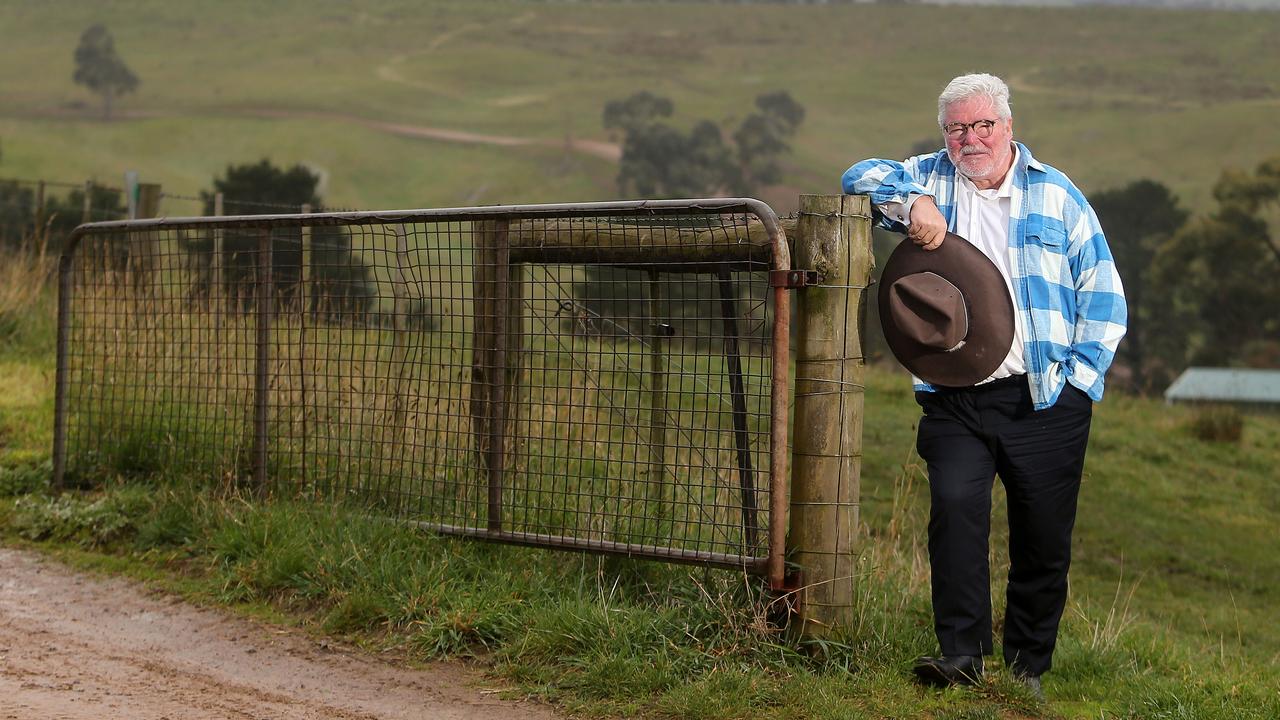
It is the middle of Melbourne’s fourth Covid lockdown and the streets of the city’s once-thriving business heart are deserted.
Offices are empty, shops and restaurants are closed and the corporate world is, en masse, working from home.
Except for David Williams.
The ebullient head of his own boutique agribusiness investment firm, Kidder Williams, can still be found in his Collins Street fourth-floor headquarters, eating takeaway from his favourite multi-starred restaurant, The Flower Drum, on the boardroom table, surrounded by a stunning collection of contemporary art and poring over paperwork as he plots his next move.
There is not enough time in Williams’ hectic life for the interruption of a global pandemic.
Not when there are deals to be done, people to talk to, projects to be planned and investments to be made. Even if the networking and schmoozing has to be via Zoom, fuelled with high-end Chinese out of plastic containers.
The much-admired, energetic and quick-thinking Williams, 67, has sat at the heart of many of Australia’s biggest transactions involving food and agribusiness companies for the past 35 years.
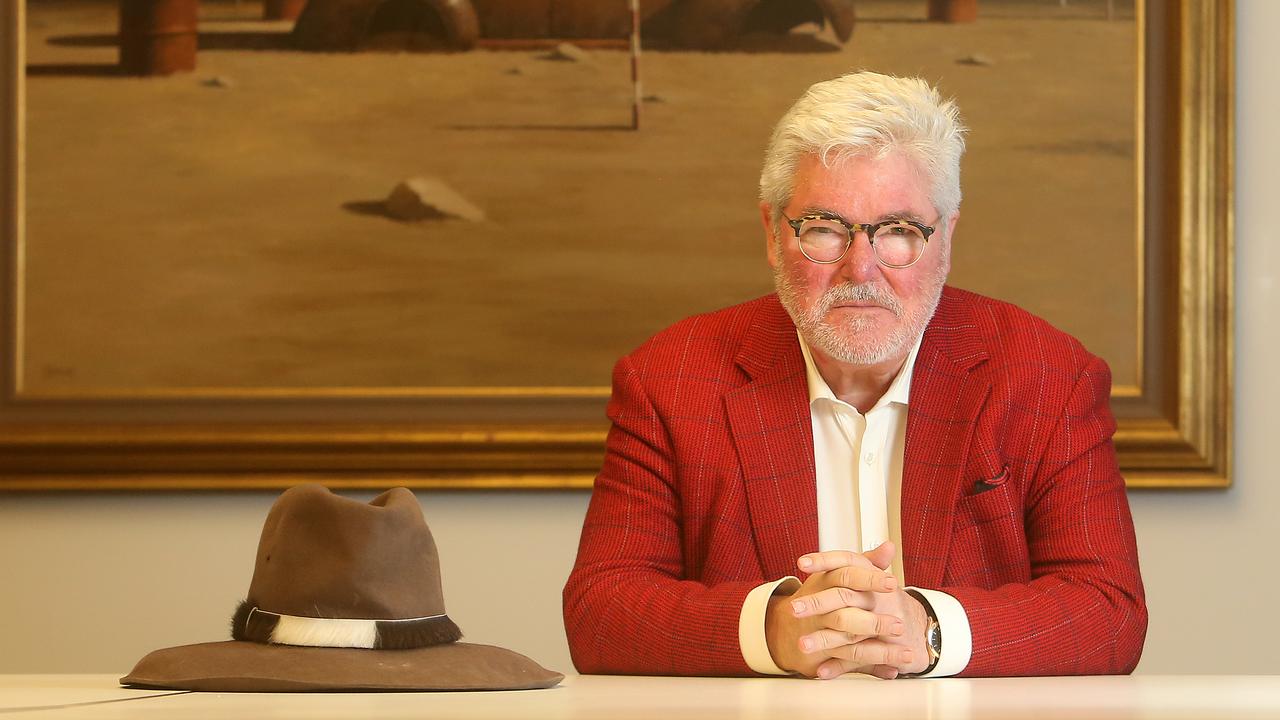
As a trusted corporate adviser, he has rescued leading Tasmanian salmon company Tassal from receivership, helped turn around the fortunes of almond grower Select Harvests, steered Bega Cheese from being a farmer-owned regional business to become a major national food company, convinced global giant Mondelez to sell the iconic Vegemite brand back into Australian hands, and advised governments and farmer co-operatives on how to amalgamate many of Australia’s small statutory authorities, state grain boards and floundering commodity co-operatives into bigger, viable and ultimately saleable businesses.
“I love what I do and I love this industry; I’m passionate about it,” says Williams, who is so omnipresent in his specialist sphere he is often called Mr Agribusiness.
“I absolutely believe in the food and agriculture growth story – and in the aquaculture story – and I’ve been doing this since the 1980s … I sit at this unique intersection of knowledge with capital.
“I know everybody in ag and food, I know their industries, I have the experience and I hear things; if you are a bit of a lateral thinker and have vision, you can then think about what might go with what and put the pieces together before anyone else does.”
And the deals keep coming. Just this year, Williams was central to Bega Cheese’s $560 million acquisition of the Lion Dairy group from Japan’s Kirin, doubling the size and diversification of ASX-listed Bega – which Williams has advised for more than 20 years – to become a $3 billion corporation in one leap.
In 2019 he helped grower-owned Mackay Sugar successfully sell 70 per cent of its shares to German sugar giant Nordzucker for $120 million, and Coca-Cola Amatil divest itself of Shepparton fruit cannery SPC for $40 million.
There has also been advisory work, capital raising and quiet deal wrangling in the aquaculture, timber, nut, sugar and horticultural spaces, with other clients including Select Harvests, Maggie Beer, the Costa Group, Premier Fruits Group and Incitec Pivot.
Just how the colourful, ruddy-faced Williams – a regular raconteur on the business conference circuit where he is jointly wooed and feared for his unpredictable flamboyancy and politically incorrect theatrics – became such a dominant figure in the food and agricultural sector is a fascinating story.
“I don’t have any rural background at all,” admits Williams, with his boyish grin and boundless energy. “I’ve never been a farmer and didn’t come from a farming family.
“But a lot of (food and agricultural) people have paid me a lot of money over the years to learn about their businesses – there’s not a food product I haven’t worked on – so I do know what happens at the back end pretty well.”
Williams’ own upbringing could not be further from that of the traditional Melbourne-based rural company director, who commonly grew up in a wealthy Western District wool squattocracy, boarded at Geelong Grammar, returned home to “the land”, and somehow ended up on the board of Elders, the Wool Corporation or even BHP.
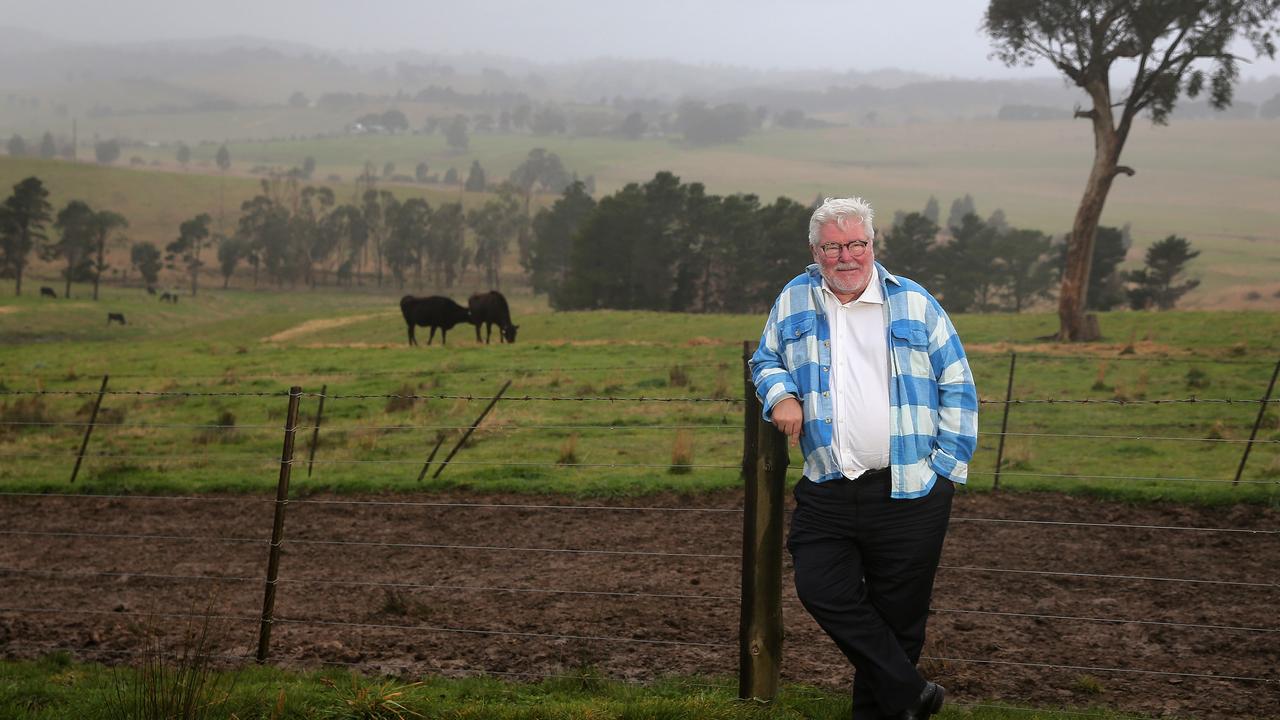
Instead Williams’ father, John, was a “ten-quid Pom” post-World War II immigrant. He fled the slums of a gloomy Glasgow as a 21-year-old, after glimpsing an alluring travel poster advertising the blue seas and bikini clad girls of Australia on a sleeting Scottish day.
John Williams worked as a tram driver in Melbourne most of his life. He met Williams’ mother, Olive, a young girl from Mackay working as a conductress at the tramways social club dance. “I like to think I was conceived on a tram,” jokes their son, who was born in 1953, the oldest of six children.
The family grew up in a new cream brick veneer house on a gravel road in Melbourne’s then-outskirts of Ferntree Gully. There were kangaroos, gum trees and galahs. But no car, no holidays and not much money.
School for Williams was Ferntree Gully primary and Boronia High. A bright boy, he didn’t realise his family was hard up until he was chosen to go on a week-long camp at the beach as the poorest kid in class.
“We never felt poor; we had shoes, we ate, and we had our own house,” recalls Williams.
“Dad had a second job as a delivery driver as well as driving trams and Mother wasn’t working until she got a job at the Tupperware factory. But that was our life. I didn’t even know Melbourne Grammar existed in those days.”
Williams’ dad wanted him to quit school at 15, to become a plumber or electrician. Instead Williams chose university; first studying business at Swinburne Tech and then transferring to fledgling La Trobe University, then a hot bed for radicalism – and sex too according to Williams – in the ’70s, where he completed his finance degree, a masters degree in transport economics and got his first job as a tutor.
Few in Australia’s agricultural world know Williams was then employed as a bright up-and-coming lecturer at the University of Sydney, teaching finance and economics, running marathons and practising rugby union for Sydney Uni alongside Australian great Nick Farr Jones.
It was there his connection with agriculture began. He became fascinated by the psychology of companies, and began a PhD study about the capital efficiency of rural co-operatives.
“I looked at why the smallest of co-ops had the lowest labour costs and less bad credit than the big banks and it all came back to psychology, because people in these small country communities knew each other and would know very quickly about any bad debts,” Williams says.
“I was fascinated, in a financial metrics way, about how this sense of community and member behaviour drives efficiency and better financial outcomes, and that led me to study how you harness the strength of a rural co-op to bolster the communities around them, increase the value of farms, and give financial strength to its farmer-members.”
Williams was soon popular on the speaker circuit – even then known for his forthright and funny speeches – as Australia’s co-operatives expert. He always argued that the principles of a pure member co-op should be valued and protected, in an era when many co-ops were financing expansion by selling shares or units to outside investors.
Williams believed the inherent conflict in these arrangements was effectively lighting the fuse to blow them up. It’s an irony not lost on the merchant banker who has watched, and sometimes been part of, the privatisation of some of Australia’s largest farmer co-ops such as Murray Goulburn, Bonlac and Bega Cheese.
But in true Williams-larrikin style, it was an address to the staid World Conference of Finance in Canberra in 1983, supposedly about behavioural economics within companies and co-operatives, that changed his life.
In the midst of a sea of dry economic presentations, Williams’ provocatively titled paper “Male Sexual Arousal and Men’s Model Behaviour” caused something of a stir.
At the end of his talk, the head of Arthur Andersen Australia out of the blue offered Williams, then 29, a job heading the company’s new mergers and acquisitions national division.
Williams had thought his lecturer salary of $38,000 a year was pretty good. The offer of $75,000 a year and an exciting new job in Melbourne was a quantum leap into the corporate world that the boy from the Gully could never have imagined. A decade later he was earning $250,000 plus bonuses.
“And guess what my first job was? The merger of SPC and Ardmona, both co-operatives, in 1984,” laughs Williams. “And 35 years later, here I am demerging SPC from Coke, in between listing it and selling it. It has gone the full circle; the gift that keeps on giving.”
Since then, deals big and small have flowed Williams’ way, following him through successive jobs at ANZ McCaughan Dyson, Hambros, Societe Generale, Challenger and, for the past 15 years, in his own Kidder Williams business.
He has bought state electricity assets worth $1.7 billion for the Americans, worked hand in glove with the Victorian Kennett government in the ’90s in its privatisation of statutory authorities and state-owned assets, helped small rural outfits such as the Geraldton Fishermen’s Co-op survive and go global in its rock lobster sales, worked with multinational companies and kept his regular clients such as Bega Cheese, Select Harvests and Tassal growing and thriving.
Many of his Kidder Williams jobs are simple transactions; cashed-up investors knocking on his door wanting to buy or sell something in food or pharmaceuticals.
But the most rewarding other part of his work is envisaging what deals and strategies, however far-fetched, might be possible and good for his clients.
After conceiving the idea, and convincing his clients and their boards of its potential merits, a passionate Williams – the ultimate rainmaker – then sets out to make the deal happen, including finding the finance to fund it all.
This is when his vaunted “people skills”, bulging contact book, media friends and ferocious networking are invaluable.
“I am good with people … a lot of that comes from being a lecturer,” says Williams. “But being good with people also goes back to having a father who was tram driver, and working after school in a milk bar; you learn how to talk to anyone whether its kids wanting lollies, young mums buying tampons, old Italian ladies, drunks and broken families. And you learn how to serve because they’re your customers.
“It’s like investment banking where you have to be a bit of a chameleon and get on with everyone … The only difference is that, in the Gully, no one ever asked you what school you went to.”
Among the proudest deals he has helped engineer, Williams ranks the popular “bringing-Vegemite-home” plan in 2017. It saw Bega Cheese buy the famous Vegemite brand and other grocery products including peanut butter for $460 million from global Mondelez.

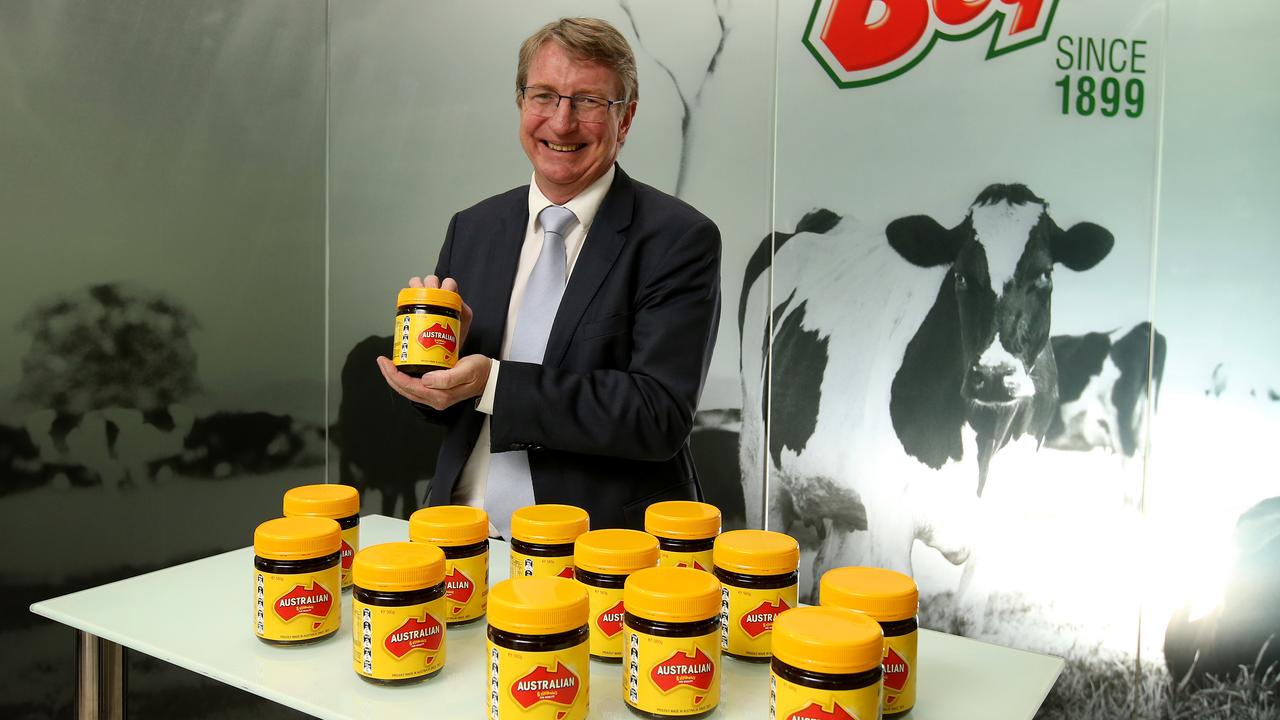
Williams dreamed up the brainwave with Bega’s executive chairman, and his closest friend of more than 20 years, Barry Irvin. “Barry still thinks it was his idea,” smiles Williams fondly, who then organised the $401 million capital raising to fund the big buy.
In the 30 food and ag deals he does every year, most are mid-market $100-$500 million, often private or family companies.
“Many of these businesses are not listed but built by the most inspiring entrepreneurial types; clients who I respect and love so much I would do the work for free,” he says.
David Williams is standing in his blue flannel shirt in the mist, trying to avoid the cold sheeting rain as he peers over the 2000 hectares of rolling farmland near Wallan, north of Melbourne, he bought four years ago.
Grazing his hills are prized black Wagyu cattle, owned by the well-known Blackmore family who lease the farm and have been tireless in revegetating the land, improving its soils, fencing off the 11km of Boyd Creek that runs through the farm and planting more than 28,000 trees.
Not that Williams aspires to turn the Wallan farm into his plush country pad or spend his retirement years drenching cattle. It’s a consequence of having acquired more wealth than he knows what to do with and his unshakeable belief in the bright future of agriculture and food.
“I’m a simple man, but I’m not really a farmer; I just like the idea of owning land especially when it’s the biggest single piece of land within a 50km radius of Melbourne,” muses Williams.
“It’s not lost on me they are subdividing (new housing estates) five kilometres from here but return on investment is not everything; I just like what Ben and David (Blackmore) are doing with their cattle and their Wagyu business.”
Besides the fees he makes from his corporate clients, Williams has also turned investor himself. It started in 2003 when Williams was advising Tassal before its receivership and no one wanted to buy the failing Tasmanian salmon farming business with its $42.5 million debt owed to ANZ.
“I knew the business so well I said I would buy it myself,” Williams says. “I couldn’t afford it but I wrote a contract (with receivers Korda Mentha) that I would pay the money subject to funding.
“So I wrote a prospectus and in three days, 60 institutions in Melbourne and Sydney I approached had pledged over $100 million; so we floated it but only offered [investors] 80 per cent of Tassal for the $42.5 million. The other 20 per cent was mine; I got it for free.”
Williams, who became Tassal’s chairman and put the new board together with Mark Ryan as its chief executive – he’s still there today – eventually sold his slice for a tidy profit. The company is now valued on the ASX at more than $800 million.
Wallan is not the only farm Williams owns. Earlier this year he pounced on 700 hectares of land for sale for $3 million on the banks of the Derwent River upstream of Hobart. He told The Mercury he had bought the Sorell Creek property – without even visiting because of Covid restrictions – because it might be a good landbank.
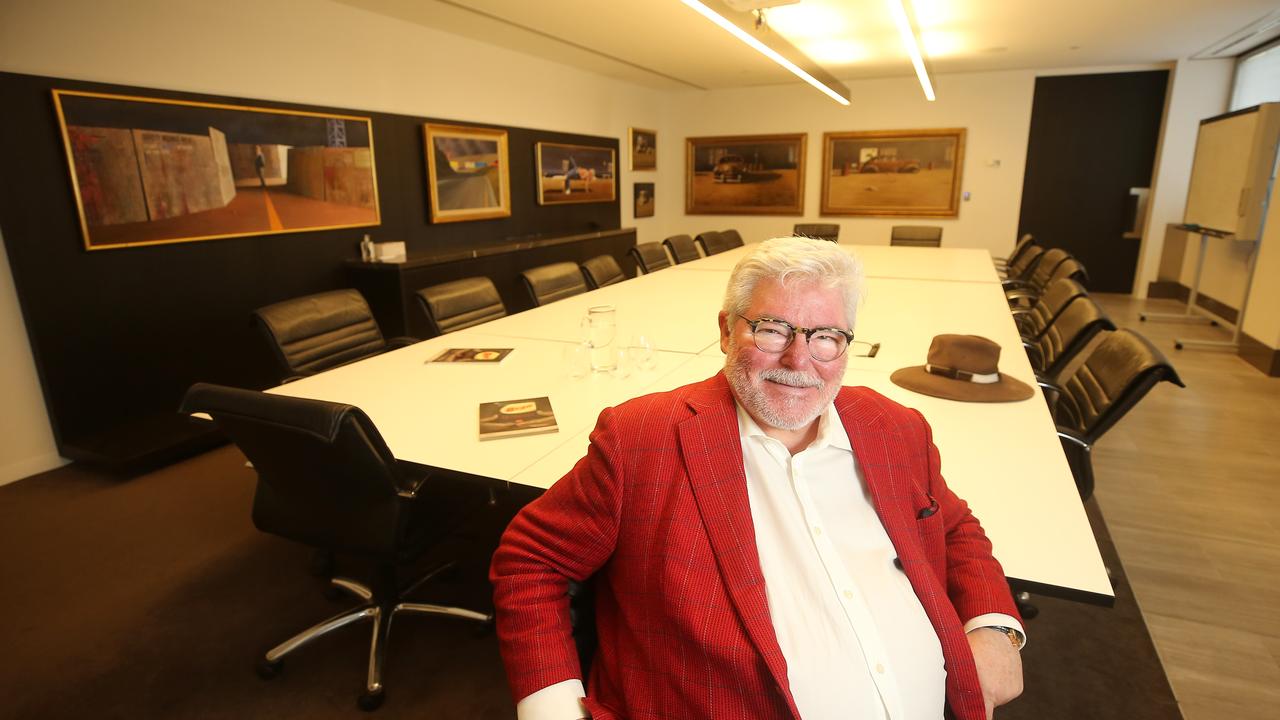
He has also invested in rural water in Tasmania, laughing that he is now branded a “water baron” by the media (although in true Williams-style, he has been known to turn up at farmer meetings discussing water ownership dressed in a big black hat and with pistols on his thick belt).
Reflecting on his future, Williams says he now wants to play a bigger direct role, pursuing passion projects of his own, pulling contacts together for greater collaboration, and offering free counsel to community groups.
These priorities include encouraging aboriginal groups in northern Australia through the Indigenous Land Council to seize the opportunity to develop and better value their own food brands.
“I think barramundi produced in the Tiwi Islands could be sold to Coles and Woolies, with the extra $1 a kilogram charged to customers going back to communities to build social equity and skills,” he says. “And their brands have an extra value too.” Williams would love to help join the dots.
Another passion plan is to raise $100-$200 million in funds from investors – and his own cash – to plant large scale pecan, macadamia and pistachio tree plantations in northern Australia and the Kimberley, irrigated using the latest water-saving technology from Israel.
Or going full circle and helping farmers set up small producer-led co-ops with a common vision and purpose.
“I know people who’ve got access to land, or to money or the technology and if I put them together I can help make these projects happen; investors are crying out for big scale food projects,” says an enthusiastic Williams.
“We have so many emerging industries and an undeveloped North, but there are just not enough visionaries in agriculture and food in Australia. But one thing I am really good at is selling the dream.”
CLOSE FRIENDS MEAN A LOT TO WILLIAMS.
Paul Thompson, the chief executive of Select Harvests almonds has worked closely with Williams for nine years and counts him as friend.
“He’s gregarious, a born raconteur and likes to be the centre of attention which sometimes makes people think twice about him. But behind all that is a very good operator … a lot of high-net worth individuals hold his counsel in very high regard,” Thompson says.
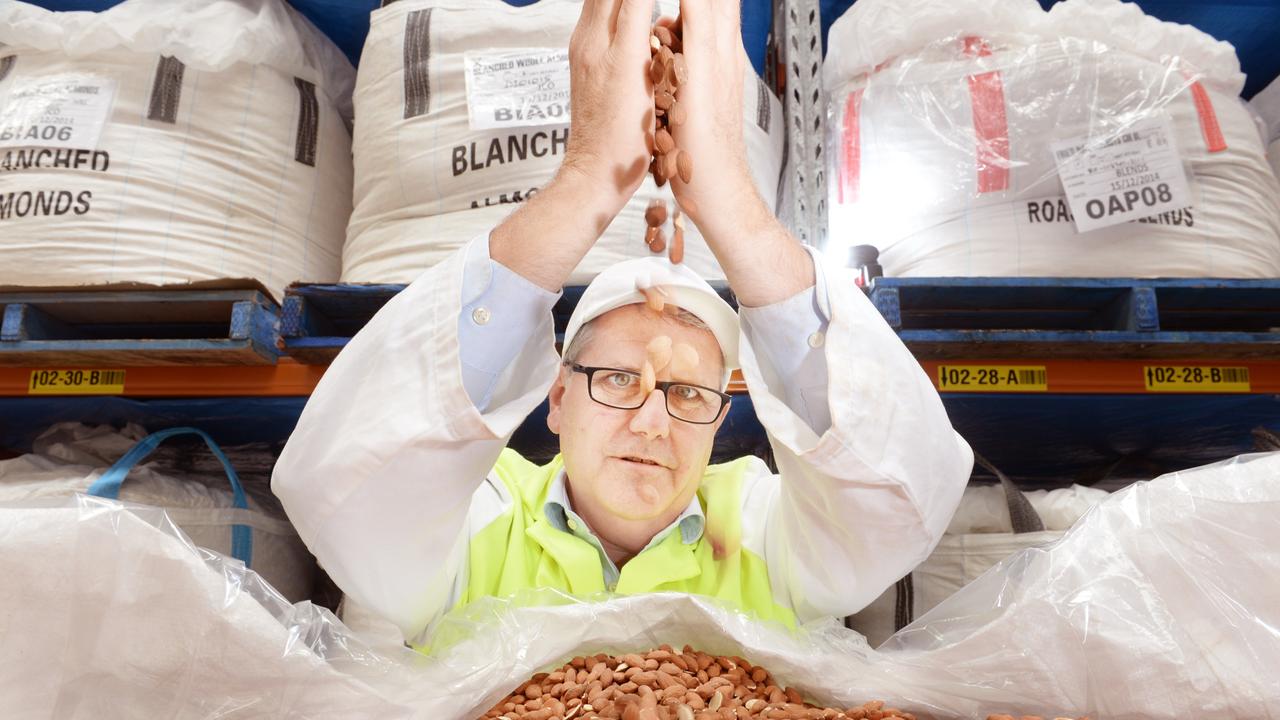
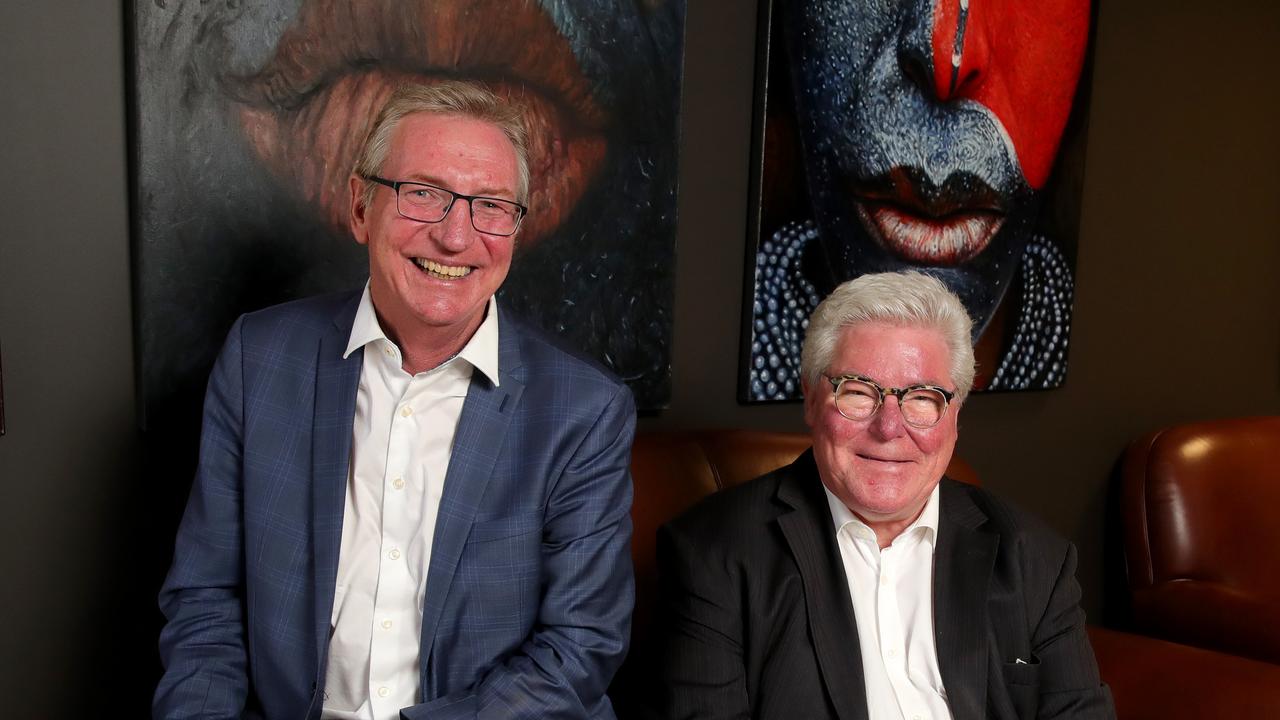
Probably his best-known friendship is with Barry Irvin, the Bega NSW dairy farmer and Bega Cheese boss who he met in 1995. In the past two years they have grown even closer as Irvin has battled, and survived cancer.
Irvin calls his trusted adviser and close mate an unlikely “lifesaver” as he lay in hospital and suffered intense chemotherapy treatments.
“David never let me push him away. He never rang and said, ‘So sorry to hear about your condition,” Irvin told The Australian last year. “Rather he would ring and say ‘What are you doing, you malingering bastard? I am coming to Sydney next week, do you want to have lunch or dinner?’.
“And I would say ‘OK’ because that allowed me to feel normal. It was a means of escape.”
Williams says his insistent invites to Irvin were all about psychological positivity. “My attitude was to continually force him to think he is coming back.”
ARTISTIC FLAIR
Contemporary art is Williams’ other deep passion beside his work and his family (he has two adult sons). He says it’s not really an investment – he buys what he likes.
His Melbourne office where his 10 staff work is jam-packed with big colourful artworks.
“I like to pick artists early before they are known – people like Graham Sydney and Roche – and support them,” says Williams, as he excitedly highlights his collection of risqué Chinese cartoon art, aboriginal burial poles, mesmerising red-eyed New Guinea mudmen and his newest painting by Mexican artist Francesco Toledo, which he just bought for $1.3 million.
Then there’s the notorious mating cow sculpture by John Kelly at the reception desk, made famous on national TV when Williams suggested the front black-and-white cow represented Australian dairy farmers and the back cow was Woolworths. (The artwork is no longer featured on Kidder Williams’ website after staff at a major client questioned which symbolised them).
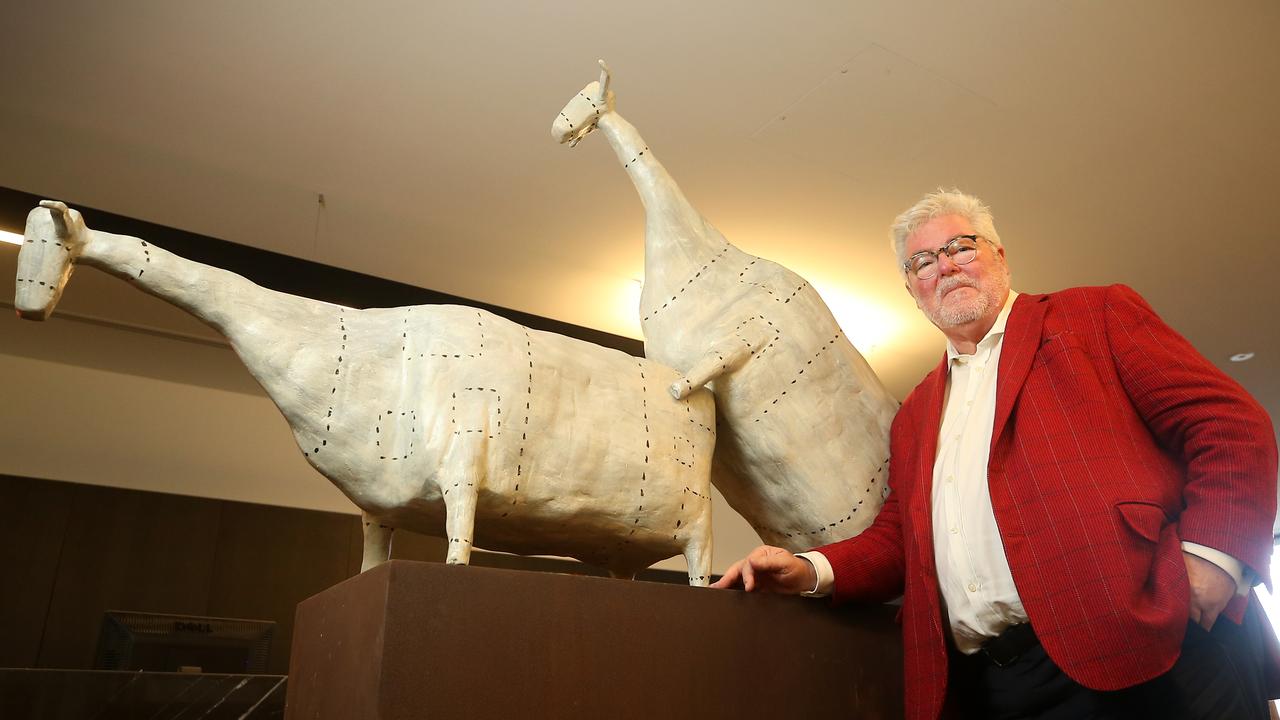
If work, family and art are Williams’ public obsessions, his generosity to artistic institutions such as the National Gallery of Victoria and the Australian Ballet is less well known. So too is his family’s quiet support for more than a dozen charities, his favourite being IMPACT which supports women and children escaping domestic violence.
FORECASTING FOOD’S FUTURE
One of the reasons David Williams is so respected within Australia’s food and agribusiness industry is that he has an uncanny knack for predicting the future; for seeing the shape of things to come before anyone else.
It has made his annual, and often contentious, predictions delivered at the close of the prestigious annual Global Food Forum an unmissable event.
Investors, chief executives, bankers and board members of some of Australia’s biggest agribusinesses and listed food companies hang on his every colourful word.
This year was no different. Although Melbourne-based Williams was absent from the Sydney 2021 GFF event in early June because of a snap Victorian Covid lockdown, his prescient observations were published in The Australian the following day and attracted their usual chorus of admirers and devotees, keen to pass on his words of wisdom to their own board of directors and executive teams.
Williams warns that the food and ag industry we knew in 2019 is gone and is never coming back.
“Try as companies might to recreate the success of years past, there is a new normal, and it has changed the industry forever. Think QR codes, think distancing, think vaccines. Many companies have not acknowledged a permanent change and are unprepared,” he says.
“Take an example of a farmer, how will he pick his produce if international travel continues to be limited; the fruit on the vine over several seasons will be well and truly spoiled by the time backpacker labourer return.
“If we could have planned (for a pandemic), we would have thought increased mechanisation, new varieties, protected cropping, new geographies, and new labour models.
“But we didn’t see the need for planning and I fear many still do not. Yet the benefits in planning, instead of just responding, have been highlighted, both in government and in the way we run our businesses.
“There needs to be a new way forged, and company boards need to understand why we are never going back and then embrace what has just happened and a new future.”









You must be logged in to post a comment.